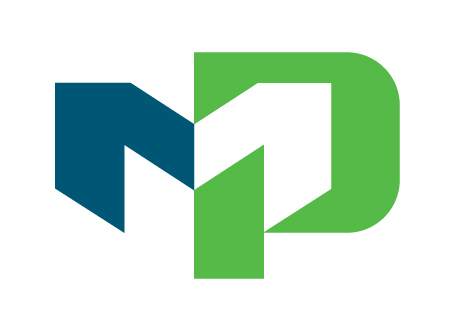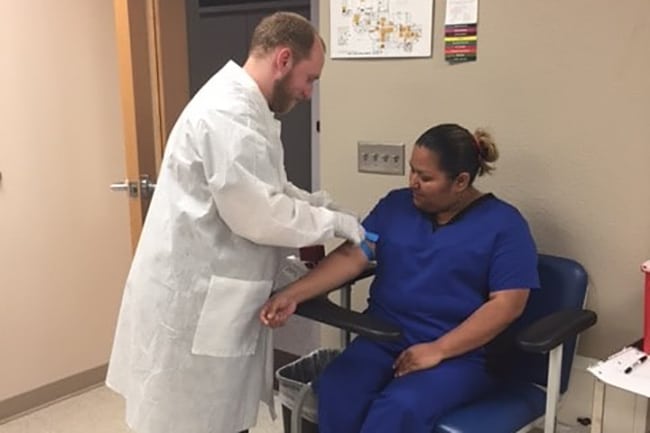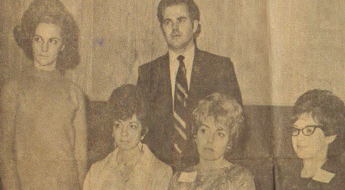Medical students break out of the classroom
Albert Einstein is known to say, “The only source of knowledge is experience” and there is much experience to gain while preparing for a future career. Students of the medical assistant program develop the skills to take medical histories, record vital signs, prepare patients for examination, collect and prepare laboratory specimens, perform basic laboratory tests, draw blood and instruct patients about medications or special diets. Medical office specialist students perform administrative tasks such as billing and insurance, greeting patients on the phone and in person, handling correspondence, scheduling appointments and updating patient records. At Moraine Park Technical College, students prepare for their upcoming careers outside of the traditional classroom.
Anne Lemke, Experiential Coordinator at Moraine Park, weighs in on the benefits of experiential learning:
“I believe Experiential Learning is a key element of a college education, enriching the student experience for greater academic and career success. It might be service learning, student organization leadership, internships, study abroad, and more! All of these experiential learning opportunities connect students with local or global business and non-profit partners, cultivate connections and collaboration, and serve community needs, while impacting individual student success,” Lemke said.
Each year, Moraine Park Technical College Medical Assistant and Medical Office students complete a variety of learning activities that take learning outside of the classroom. At the end of the programs, students complete a 160 hour practical experience in a clinical setting; however, there is also a great deal of experiential learning that occurs throughout the program through field trips, service learning and community engagement.
When hearing the phrase field trip, you may have fond memories of childhood trips that include a school bus and bagged lunch. Our field trip experiences provide opportunity to gain additional insight regarding concepts introduced in the classroom and also produce fond memories, even without a school bus!
This year, the MPTC Medical Office Professionals Student Club and Marian University’s School of Business Student Club visited Epic to learn about the history and future of Epic EHR systems. Epic reports more than 190 million patients have an Epic health record and a significant number of healthcare organizations use Epic for their electronic health records. The students in attendance were able to get a glimpse of the software program that many will begin using during their clinical experience at the end of their programs and in their future careers as healthcare professionals.
Marly Thao, a Healthcare Administration major and Business Club Secretary at Marian University participated in the event. “Going to Epic was an awesome experience, not to mention the exquisite interior design that they have at Epic. We learned a lot about how Epic functions as an organization. I use Epic’s electronic health record (EHR) as an employee of Aurora Healthcare, and it was really nice to see how Epic maintains their relationships whether it be national or international. After this experience, I have grown my interest in Epic as a whole organization.”
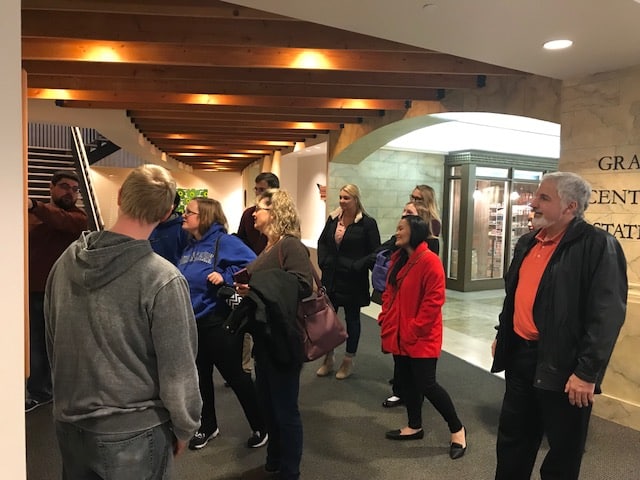
Students and faculty tour the Epic campus to learn about the EHR system.
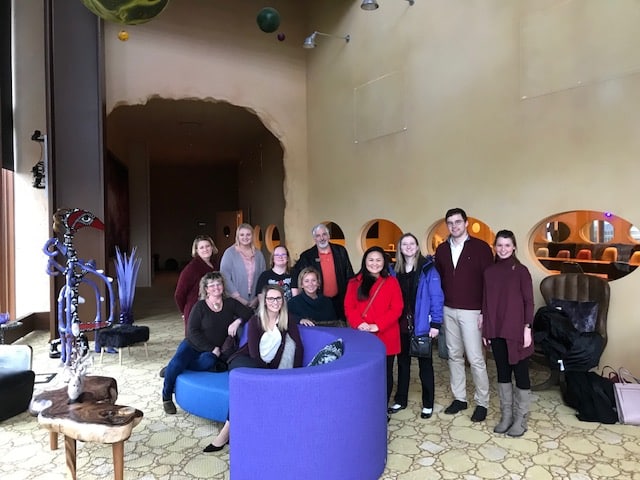
The student and faculty tour group gather in one of Epic’s themed conference rooms.
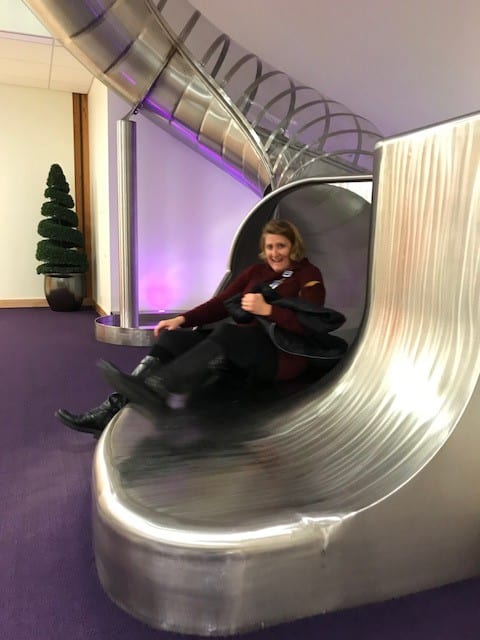
Medical Assistant Instructor Janet Bauer having an “Epic” time as she chooses the slide over stairs.
Medical assistant students recently visited the Fond du Lac County Public Health department as an activity linked to learning in emergency preparedness, nutrition & health promotion, community resources and immunizations. Joyce Mann, RN, Public Health Nurse Supervisor with the department coordinated presentations and speakers from various programs supported by public health. Alex Kohls, a current medical assistant student who participated in the trip comments on how much he gained from the experience. “I didn’t grow up needing assistance from any programs so I never knew about all the help out here for people who can really benefit from help. I feel like the media stereotypes the people that need help and that’s why lots of people and families don’t go for help. I think the field trip opened my eyes and many more from my class. It was great to here from the people who get to see firsthand and work first hand with these programs and the people they help. You can see and feel the passion these workers have and the drive they have to help more and more people and families within the community. It’s always a great way to learn and be motivated to go help others myself”.
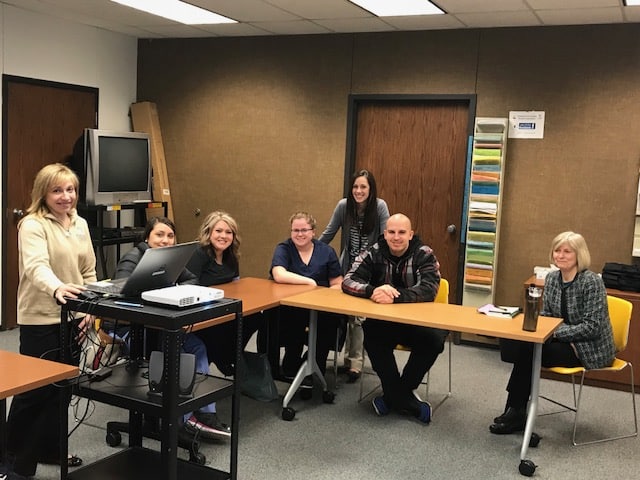
Fond du Lac County Public Health Director Kim Mueller stops for a visit while students learn about programs and community resources.

Medical Assistant students are trained in emergency preparedness.
Service learning is also another type of experiential opportunity that combines community service with classroom instruction. While this kind of experiential learning includes volunteer activity (the service), its focus is on application of classroom learning (the learning) to the activity. Students help their community as part of a course. Julie Skorbier, CMA (AAMA) is a 2017 graduate of the medical assistant program who participated in service learning with Fond du Lac County Public Health and the Fond du Lac School District, performing hearing and vision screenings for school-aged children. “I feel that doing the elementary vision screenings from some of my service learning was beneficial. It made me realize that I enjoy working with children and wanted to pursue the position that I now hold”. Today, Julie is employed as a school nurse with the West Bend School District. Although the majority of graduates pursue employment in a medical office setting, service learning experiences have opened avenues to employment in other settings such as schools, corrections and public health.
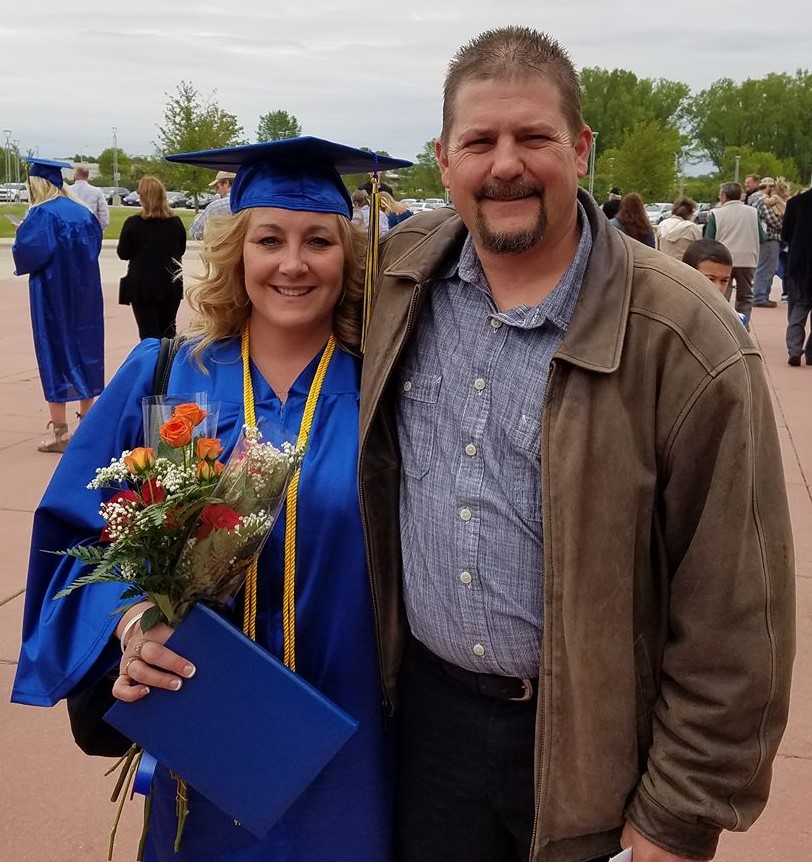
Julie Skorbier, CMA (AAMA) celebrates her 2017 graduation with family.
If you are interested in learning more about the Medical Assistant , Medical Office Specialist , or Medical Office Management programs and careers, please contact an admissions counselor today.
**Coming in June 2018, we will be bringing back our Medical Assistant Cohort Program (click to watch a short video) which provides students with the opportunity to get their Medical Assistant Technical Diploma in ONE YEAR!
